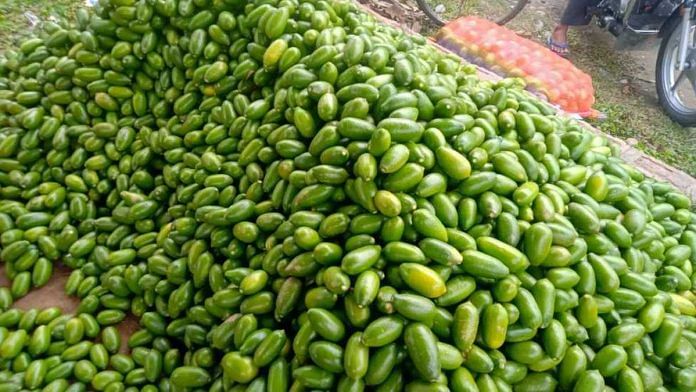Nearly a hundred kilometres away from Guwahati, in a small village in Assam’s Baksa district, once known for ULFA training camps for insurgents, farmers are growing fragrant lemons that are now coveted by London and Dubai. The Kaji Nemu is an indigenous variety of lemon and has been a staple of every Assamese household. The taste of the lemon is such that people don’t even waste the rind or leaves.
One of the villages from where the Kaji Nemu reached London is Aouhata, which in Assamese means ‘inaccessible’. But through the joint push by Nilachal Agro Producer Company of Salbari, the Agriculture and Processed Food Products Export Development and Authority (APEDA), and the former Deputy Commissioner of Baksa, this inaccessible village and its farmers could access English markets.
“The lemons were sold at roughly Rs 35 per kg, which made a big difference for the farmers who were selling it at Rs 9-10,” says Ayush Garg, the former Deputy Commissioner of Baksa. In local markets, even in the peak season of August, the lemons would fetch just 40 paise per piece. Foreign exports are changing that.
The attraction abroad? Its fragrance, size, and the fact that it is seedless. The Kaji Nemu, which has a Geographical Indication (GI) tag, is opening up new avenues for Assam’s small land-owning farmers. The state produces over one lakh tonne of the lemon variety each year, with Dibrugarh district being the highest producer. And India and the world is slowly acquiring a taste for it.
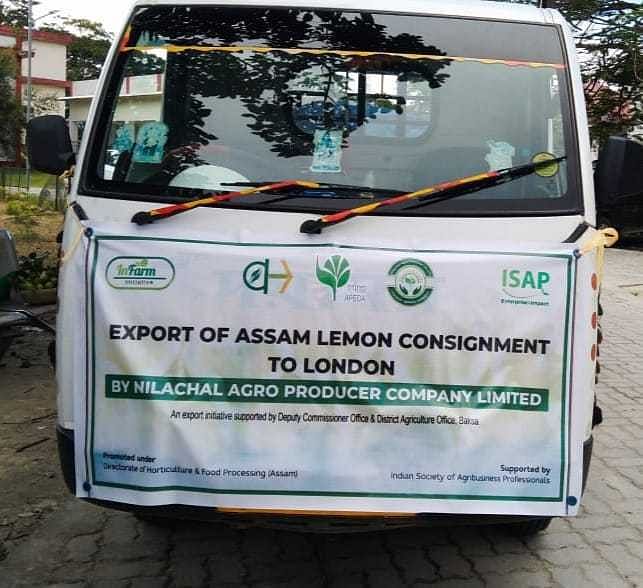
Also read: The importance of GI tags: Why Bengal is celebrating its rasogulla victory
Baksa to London—When life gives you lemons
Like most good endeavours, the Kaji Nemu’s journey abroad began during a seemingly innocuous conversation that Ayush Garg had when he was the deputy commissioner of Tinsukia. While conversing with a resort owner, he came to know that London is now home to many Assamese families who crave ingredients from back home. “For products like Kaji Nemu, you have to look for a niche market. When I was appointed to Baksa and made aware of the need for a market, I recalled that conversation,” he says.
The journey to Aouhata is a bumpy ride, but a green one with fields of rice on either side. Assam-style houses—single storied, partly pucca, partly thatched huts—flank the road leading up to Soniram Topo’s two-bigha Kaji Nemu farm.
“The plant starts flowering in April and then slowly progresses to become the lemons you see here,” says Topo walking among rows of Kaji Nemu plants, with branches still laden with fruit, despite the harvest having been collected a month ago. “I am happy lemons grown here are going to London.” Topo started growing lemons in 2015 and in seven years, his produce reached British kitchens.
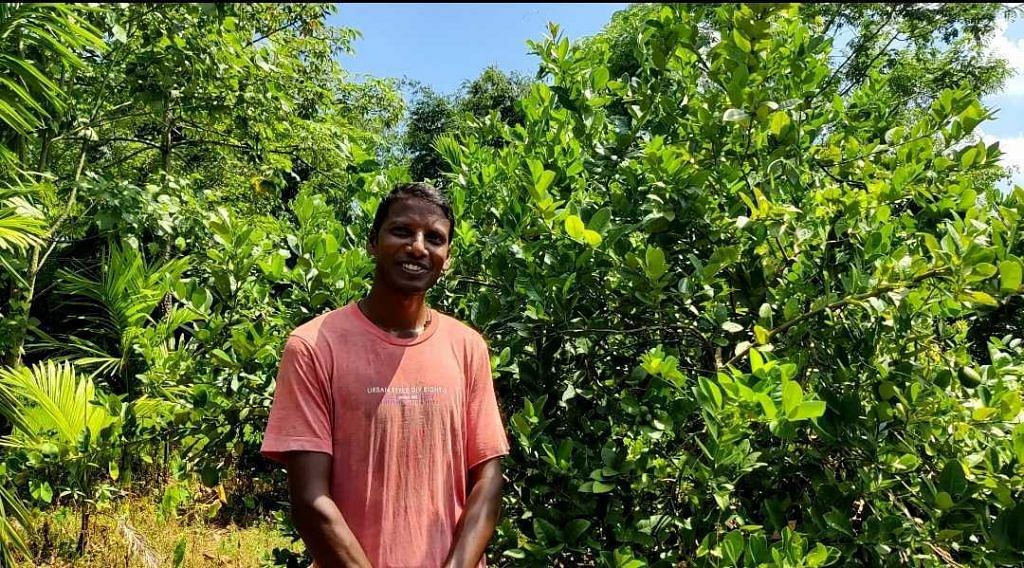
There are roughly 2,000 households engaged in lemon cultivation in the Gati area. For Aouhata, it has brought in much more money. Most farmers grow rice as the primary food grain, but also have roughly two bighas of land dedicated to lemon trees. Their association with the Nilachal Agro Producer Company started in 2020 when the farmer-producer company was formed. It has been working tirelessly to market the Kaji Nemu and get the best rates for the farmers.
The export and distribution of the lemon to London’s New Spitalfields Market are handled by Kiega Exims Pvt Ltd. It is one of the UK’s premier wholesale markets for fruits, vegetables and flowers.
“Earlier, the customers for the Kaji Nemu would be Indians or Bangladeshis living there. But now, we also find English customers queueing up to buy these. Due to its fragrance, some like to use it in cocktails,” says Kaushik Baruah, director of Kiega Exims.
Chef Kashmiri Barkakati Nath, a home chef known for her Assamese delicacies, vouched for the flavour of the citrus in an interview with EastMojo. “It [Kaji Nemu] is my go-to ingredient, a squeeze of lime adds zing to both savoury and sweet dishes and the zest has its wonderful citrusy aroma that works brilliantly in most dishes. I add it in both my Indian and European dishes,” she says.
Also read: Indian restaurants in London have found something new in the flavours of northeast
An ‘accidental’ fruit
For all its fame in Assam thalis, the Kaji Nemu was an ‘accidental discovery’. The information booklet on GI tags in India states that the variety originated as a chance seedling in the Burnihat citrus station. It was the product collected under the name Chinakaghi from Hashara village of Sivasagar. Kaji Nemu received the GI tag in 2020.
What is special about the Kaji Nemu of Assam that prompted its export?
The kaji nemu is different from the round, table tennis-ball-shaped variety usually consumed in North India. It’s nearly thrice that lemon in size and its citrus content is 1.08 – 2.10 g/100ml. It is also production-friendly because it delivers fruits all year long, and it doesn’t fall off the tree even if it is overripe, lessening the damage to the fruits.
The other advantage is intercropping, which means growing crops next to the lemon trees. Some commonly grown options are papaya, pineapple, and in recent times, the expensive dragon fruit.
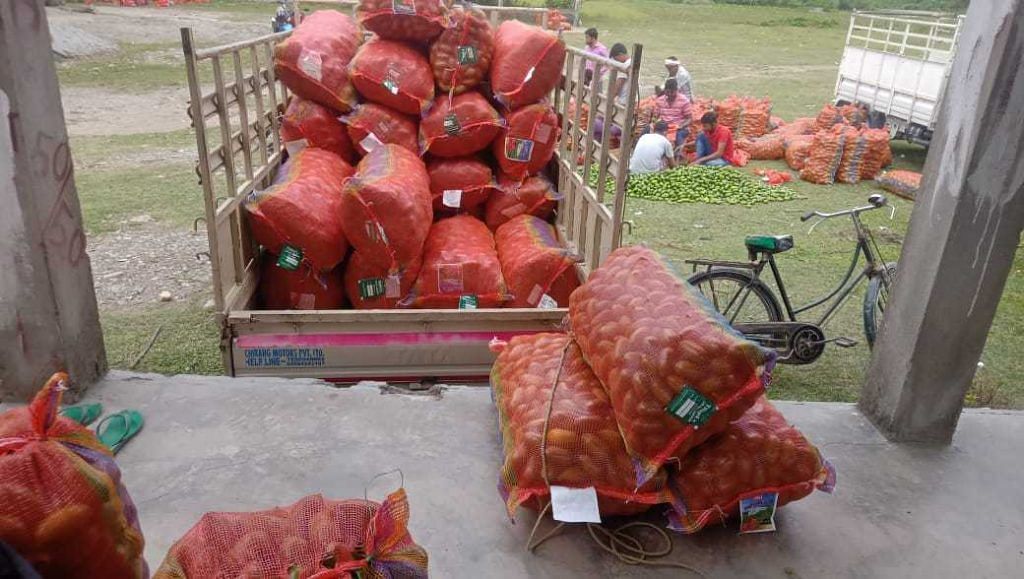
Also read: China loves Guntur chillis — How the Andhra district produced a spicy global product
A long way to go
While roughly 4,000 pieces of Kaji Nemu reached London, the story is not over. For a good profit margin for the farmers, a sustained effort is necessary. “We are planning to expand the marketing and selling of lemons beyond the raw fruit, with value addition. We want to make Assam lemon squash and will set up a small industry,” says Manash Kalita, CEO of Nilachal Agro Producer Company.
Kalita said that while they were displaying the lemon and its plants in Delhi, many requested for a sapling. While the yield definitely varies in an indoor planter, many were interested in having one for their homes.
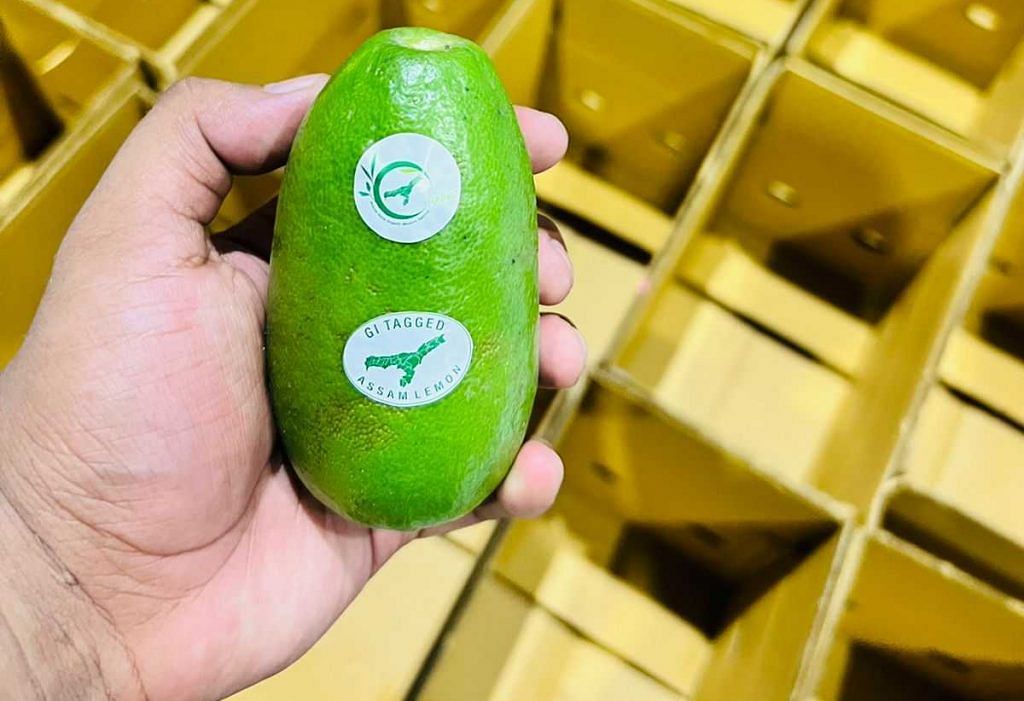
The current push for trying to find global markets for local produce is being implemented under the Narendra Modi government’s Horticulture Mission for North East and Himalayan States. “The government’s support has been tremendous,” adds Kalita.
From seminars to loans, there is a push for farmer-producer companies to both learn and implement marketing strategies so that farmers like Topo can get better prices. But for now, there is the hope that other states in India and countries will want to taste the Assamese Kaji Nemu too.
(Edited by Neera Majumdar)


